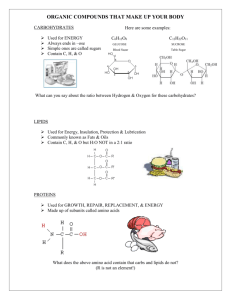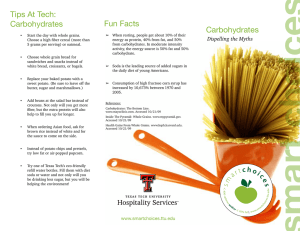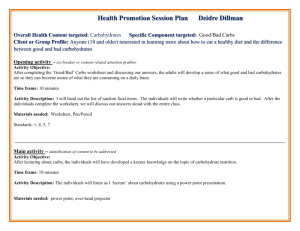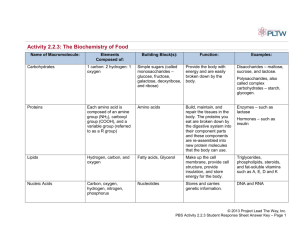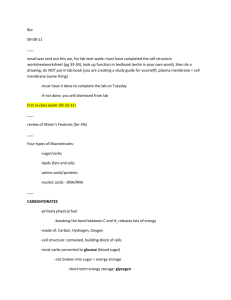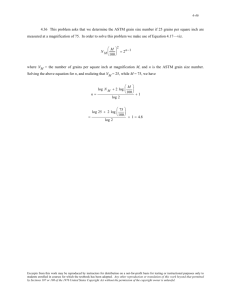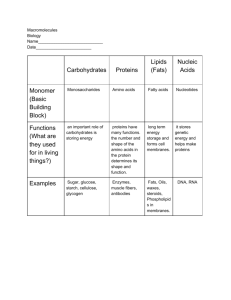Whole Wheat Grain
advertisement
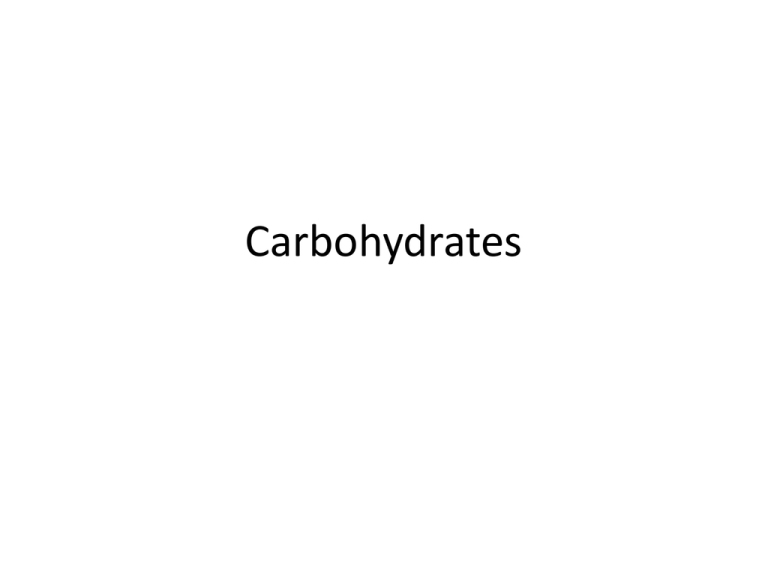
Carbohydrates Grains According to myplate.gov • Any food made from wheat, rice, oats, cornmeal, barley or another cereal grain is a grain product. • Bread, pasta, oatmeal, breakfast cereals, tortillas, and grits are examples of grain products. Whole Grains Vs. Refined Grains Whole Wheat Grain • Grains are divided into 2 subgroups – Whole Grains – Refined Grains. – Whole grains contain the entire grain kernel ― the bran, germ, and endosperm. Examples: whole-wheat flour bulgur (cracked wheat) oatmeal whole cornmeal brown rice Refined Grians Process of Milling • Refined grains have been milled, a process that removes the bran and germ. • This is done to give grains a finer texture and improve their shelf life, • Milling removes dietary fiber, iron, and many B vitamins. • Examples white flour de-germed cornmeal white bread white rice Enriched nutritional math: Whole-grain wheat – 11 nutrients + 5 nutrients = “Enriched” • Most refined grains are enriched. • This means certain B vitamins (thiamin, riboflavin, niacin, folic acid) and iron are added back after processing. • Fiber is not added back to enriched grains. • Check the ingredient list on refined grain products to make sure that the word "enriched" is included in the grain name. The primary function of carbohydrates is to provide energy for the body, especially the brain and the nervous system. • Carbohydrates are classified as simple or complex. • The classification depends on the chemical structure of the food, and how quickly the sugar is digested and absorbed. • Both simple and complex carbs have one purpose: to provide energy. Your body breaks down carbs for immediate fuel. Simple Carbohydrates • • • • • Simple carbs are made of one to two sugar molecules. Single sugar carbs come from fructose and galactose, while double sugar carbs come from lactose, maltose, and sucrose. Healthy simple carbs can be found in fruit, milk products and vegetables. Simple carbs also are found in refined or processed foods such as candies, cakes, pies, cookies and regular soda that provide calories, but have very little nutritional value. Complex Carbohydrates Complex carbs contain three or more sugar molecules Beans, lentils, dried peas, starchy foods, and whole-grain breads and cereals. Complex carbs have the added benefits of vitamins, minerals and fiber, which are lost in the processing of refined carbs. Many complex carbs also contain fiber, which cannot be broken down into a single sugar molecule and so goes through your body undigested. Fiber helps lower your cholesterol, keeps your large intestine healthy, helps you feel full longer and helps control blood sugar levels. Obesity and Children Proteins Proteins and Uses: • Protein builds, maintains, and replaces the tissues in your body. • Your muscles, your organs, and your immune system are made up mostly of protein. • Best sources are beef, poultry, fish, eggs, dairy products, nuts, seeds, and legumes like black beans and lentils. Breaking down of proteins • When you eat foods that contain protein, the digestive juices in your stomach and intestine go to work. • They break down the protein in food into basic units, called amino acids . • The amino acids then can be reused to make the proteins your body needs to maintain muscles, bones, blood, and body organs. Amino acids • • • • There are 22 amino acids, your body can make 13 of them. Your body can't make the other 9 amino acids, but you can get them by eating protein-rich foods. They are called essential amino acids because it's essential that you get them from the foods you eat. Protein from animal sources, such as meat and milk, is called complete, because it contains all nine of the essential amino acids. Most vegetable protein is considered incomplete because it lacks one or more of the essential amino acids. How much is enough?? • You can figure out how much protein you need if you know how much you weigh. • Each day, kids need to eat about 0.5 grams of protein for every pound (0.5 kilograms) they weigh. That's a gram for every 2 pounds (1 kilogram) you weigh. • To figure out your protein needs, multiply your weight in pounds times 0.5 or you can just take your weight and divide by 2. • For instance, a 70-pound kid should have about 35 grams of protein every day. Protein Deficiency diseases Kwashiorkor Marasmus
